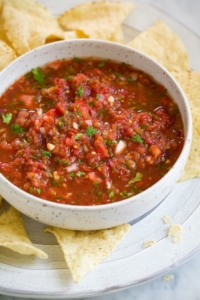Ultra-processed foods (UPFs) are attractive, convenient, delicious, and deadly
Recent research
Eating more ultra-processed foods (UPFs) was associated with a greater risk of death from any cause according to a study published in November 2024 that tracked 38,148 adults in the US for a median of 8 years. The specific UPFs associated with the higher risk of death were sugar-sweetened beverages, ready-to-eat or -heat mixed dishes, ultra-processed dairy products, and ultra-processed oils/fats, condiments, and sauces.
Other recent studies have found additional bad health outcomes associated with UPFs. A review and meta-analysis published in January 2024 associated UPFs with a greater risk of death from any cause, heart disease, type 2 diabetes, anxiety, depression, poor sleep, wheezing, and excess body weight. A study with 10,775 middle-aged adults in Brazil tracked for a median of 8 years found eating more UPFs was associated with faster rates of decline in cognitive and executive function.
Several mechanisms for how UPFs can harm our health have been identified. UPFs can alter the site and rate of digestion and absorption as well as make changes to the gut microbiome. Plus, when we eat more UPFs we tend to decrease intake of healthy foods, so much so that we may not get enough of the nutrients we need, such as fiber, vitamins, minerals, and antioxidants.
Definition of ultra-processed foods
Ultra-processed foods (UPFs) are made from a mixture of mainly non-whole food ingredients. Starches, sugars, oils, fats, and other ingredients are refined or extracted from whole foods via processing methods that can involve chemicals, biological compounds, physical processes, and extreme temperatures. These ingredients may then be subject to further processing before mixing into final food products. Additives may also be used to improve the food product’s taste, texture, or appearance (e.g., flavorings, flavor enhancers, sweeteners, thickeners). The packaging of UPFs may also be able to leach health-harming substances.
A quick review of the ingredients list of a food product can reveal whether it is an UPF. If one or more ingredients listed on the packaging are not typically used in home cooking, then the food product is likely an UPF. Consider regular colas. We are not likely to have all the ingredients listed on the packaging of a popular brand of regular cola—carbonated water, high fructose corn syrup (HFCS), caramel color, phosphoric acid, natural flavors, and caffeine—in our kitchen pantries at home.
Tip to reduce UPFs
Replace packaged condiments with easy to prepare, home cooked condiments. Check out the recipe below for a sweet tomato relish to use on sandwiches. Notice that all the relish’s ingredients are recognizable, whole foods.
By Janet Malanga, RD, LD
Sweet Tomato Relish
Servings: 8
Preparation time: 10 minutes
Ingredients
¼ cup (32 g) Carrot, chopped
2 T (20 g) Onions, minced finely
¼ cup (56 g) Banana, mashed
2 cups (360 g) Tomatoes, minced finely
Instructions
- Microwave the carrot pieces for 2-3 minutes or until soft. Mash the carrot.
- Microwave the onions in a covered microwavable dish for 1 minute 30 seconds, or until translucent.
- Stir to combine all ingredients.
Storage
Safely store for up to 3-4 days in the refrigerator and up to 1-2 months in the freezer.
References
- Wang L, Steele EM, Du M, et al. Association between Ultra-processed Food Consumption And Mortality among U.S. Adults: Prospective Cohort Study of the National Health And Nutrition Examination Survey 2003-2018. J Acad Nutr Diet. Published online November 2024. doi:10.1016/j.jand.2024.11.014
- Lane MM, Gamage E, Du S, et al. Ultra-processed food exposure and adverse health outcomes: umbrella review of epidemiological meta-analyses. BMJ. Published online February 28, 2024:e077310. doi:10.1136/bmj-2023-077310
- Gomes Gonçalves N, Vidal Ferreira N, Khandpur N, et al. Association Between Consumption of Ultraprocessed Foods and Cognitive Decline. JAMA Neurol. 2023;80(2):142. doi:10.1001/jamaneurol.2022.4397
- Monteiro CA, Cannon G, Levy RB, et al. Ultra-processed foods: what they are and how to identify them. Public Health Nutr. 2019;22(5):936-941. doi:10.1017/S1368980018003762
- Coca‑Cola® Original. The Coca‑Cola Company. 2024. Accessed December 15, 2024. https://www.coca-cola.com/us/en/brands/coca-cola/products/original#accordion-c55f229edc-item-93131ee8b3
- FoodKeeper App. U.S. Department of Health & Human Services. April 26, 2019. Accessed June 22, 2022. https://www.foodsafety.gov/keep-food-safe/foodkeeper-app




